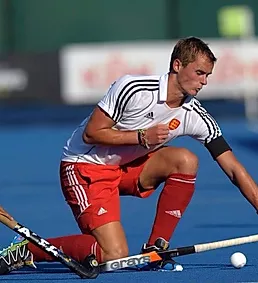Sam French
Economics Graduate and Associate at Deloitte UK
Current Hockey Player for Hampstead and Westminster, Former Scholarship Athlete
Former GB U21’s and England U21’s International
Former clubs: Ben Rhydding, University of New South Wales, University of Birmingham
Give us a bit of a timeline of your career to date…
I started competing at the age of 7 for Ben Rhydding Hockey Club U10s, before making my first team debut for them aged 13. At 14, I was selected to represent England U16’s to compete in various international competitions. I then moved through the age groups with England, whilst continuing education alongside this.
After school I took a year out during which I represented GB U21’s for the first time, in the Youth Olympic Festival (Sydney Australia), picking up a silver medal. I then competed out in Australia for a season before starting an Economics degree at the University of Birmingham.
I continued to represent England and GB at U21 level, competing in the Junior World Cup at the end of 2013, and won a bronze medal in the European Championships. I balanced this alongside my studies as well as captaining the University of Birmingham’s first team squad as a scholarship student.
After graduating with a 2:1, I started professional work, getting on to Deloitte’s Audit graduate scheme. I continue to compete, playing for Hampstead and Westminster in the Premier League and have just qualified for the end of season play offs with the aim of qualifying for Europe next year.
How did you first get involved in hockey? And when did the opportunity come to start competing at an elite level?
Both my parents played hockey, so I was introduced to it by watching them when I was young, which made me join my local club. I got my first breakthrough into ‘elite’ hockey at 14, when I was selected for England U16’s.
To date, what’s been your greatest achievement in sport?
Has to be winning a Gold Medal at Sultan of Johor Cup in 2015. We beat India in the final on penalties having lost to them in the final the previous year.
What were the biggest challenges, and best aspects of training and competing as an elite athlete?
Sacrificing your social/personal time, especially things like group holidays and big social occasions which a lot of your friends and family can have freedom to do. Taking your sport seriously means you can’t do the same! Also, now especially living and working in London, there are a lot of early starts, late finishes and lots of travelling during the week and weekends which can be mentally draining.
But there are great rewards from the sacrifice, and you get to meet people across the world, make lifelong friends and see great cities across different continent whilst competing with and against some of the world’s top players.
Having grown up and developed through elite sport, do you think the environment of elite sport has helped you in your professional and personal career now?
Definitely. There are so many transferable skills from the sports field into the workplace. To name a few…Teamwork, performing under pressure, and being able to manage my time efficiently. These are all helping me now in my professional working career.
Firstly combining education with elite sport, and now the latter with professional work, what are the challenges you face with dual-careering?
One of the hardest challenges has been planning ahead to ensure that neither education nor my hockey suffered from the other. For example, not missing training because of deadlines, and not missing a deadline if I’m away at a training camp the week before. This takes a lot of preparation, organisation and flexibility.
Since I have started working, the toughest aspect has certainly been a lack of time. Whereas at university I could fit in gym sessions in between lectures or over lunch, you simply don’t have the flexibility to do this when in a professional role. This has meant getting up before work and/or making sure I organise with my manager to finish on time to get to training sessions.
Also, more recently – travelling back from an away game on Sunday and having to get up on a Monday morning for work is tough!

How would you say your lifestyle is benefiting from dual-careering?
Hockey gives me a focus away from work, and work gives me a focus away from hockey, I feel they both bounce off each other. It is great to be able to turn up to training and completely forget any problems that may have come up during the day at work. Again if we have had a bad result at the weekend, having a focus away from hockey with my work certainly helps you to move on quicker.
The obvious one also is fitness. Training is non-negotiable at the level I play, and so even on days when I don’t feel like training after work you have to make the effort. This definitely is a benefit of playing a team sport as you don’t want to let your team mates down. This helps me to continue leading a balanced lifestyle.
And finally, what advice would you give to athletes who face similar circumstances to the ones you went through, either leaving elite sport, or having to combine a professional career with elite performance sport?
Don’t underestimate the experiences and skills you have developed through elite sport. Many of the attributes you will have gained through competition and training align to those that many top firms are looking for in candidates.
Also, when it comes to dual-careering after education, it is important you communicate to colleagues/managers as early as possible to ensure they understand your training workloads outside of work, and the importance it has on you and your lifestyle. If you do this well, I have found my manager’s here at Deloitte have been great in allowing me to be flexible and work around training.

